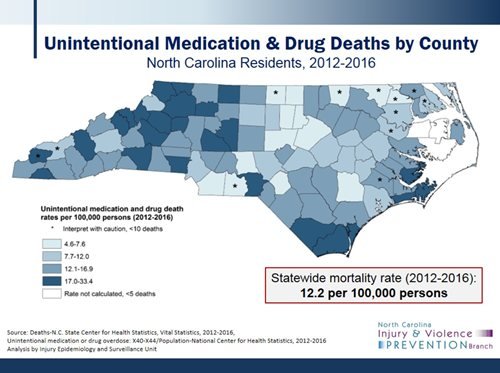The opioid epidemic is taking lives and tearing families apart across our state and the country.
More people die in North Carolina of an accidental drug overdose–usually an opioid–than from any other cause of accidental death.
Visit More Powerful NC to learn how communities across the state are taking action to take back their communities from the devastation of the opioid crisis.
The Problem
Nearly every person in North Carolina has been touched in some way by addiction. Whether it’s through personal experience, or that of a family member or a friend, the opioid epidemic has hurt people all across our state.
- Five people die from opioid overdoses every day.
- More people die from opioid overdoses than car crashes.
- More than 2,000 North Carolinians died of an opioid overdose in 2017 – a 32 percent increase over the previous year.
- Between 1999 and 2017, more than 13,169 North Carolina residents have lost their lives to unintentional opioid overdoses.
- The number of unintentional overdose deaths in 2017 was nearly 17 times higher than in 1999.
- The number of unintentional opioid overdose deaths has more than doubled in the past decade.
Learn more at More Powerful NC.

Source: ncdhhs.gov
Legislative Response
North Carolina has responded to the opioid epidemic with three recent laws drafted by our office and sponsored by Representatives Greg Murphy and Craig Horn, Senators Jim Davis and Tom McInnis, and other members of the North Carolina General Assembly.
The Strengthen Opioid Misuse Prevention (STOP) Act
The STOP Act (2017) aims to reduce the number of people who become addicted to prescription opioids. The Act:
- Sets a 5-day limit for an initial prescription for acute pain (7 days for pain following surgery) to reduce the number of people who become addicted to pain medications and reduce the number of unused pills sitting in medicine cabinets
- Requires prescribers to check the Controlled Substances Reporting System database before prescribing opioids to reduce adverse drug interactions, duplicative prescriptions and doctor-shopping
- Requires electronic prescribing of opioids to cut down on prescription fraud
The Synthetic Opioid Control Act
The Synthetic Opioid Control Act (2017) helps law enforcement authorities go after fentanyl traffickers by ensuring that all derivatives of this deadly drug are classified as controlled substances under state law.
The Heroin and Opioid Prevention and Enforcement (HOPE) Act
The HOPE Act (2018) gives law enforcement authorities tools for addressing the opioid epidemic. The Act:
- Ensures that our drug trafficking laws cover trafficking in the deadly drug fentanyl
- Gives law enforcement quicker access to the information they need to investigate diversion of prescription drugs from legal to illegal uses
- Protects patient safety by strengthening laws against theft of drugs by healthcare workers and first responders
- Expresses the General Assembly’s intent to provide greater funding for drug treatment and recovery services
The Solutions
To confront this epidemic, we need cooperation among law enforcement, medical prescribers, the public health community, and the treatment and recovery community. Prevention, treatment and enforcement are critical.
Prevention
Prevention should educate both the people who misuse prescription drugs and the doctors and dentists who overprescribe them.
Our state particularly needs proven programs directed to young people to help them avoid risky behaviors. Illicit or non-medical use of painkillers is the highest for youth and adolescents.
Teens and young adults report that prescription drugs are easy to access and seem safer than other drugs. More than 20 percent of North Carolina’s 11th graders have taken prescription drugs without a doctor’s prescription.
After just a few days on an opioid, some patients’ brain chemistry begins changing to create an addiction. We must educate North Carolinians about the dangers of these medications if they are unneeded.
Learn more about prevention strategies and how you can get involved at More Powerful NC.
Treatment
Because addiction can happen so quickly and has become so common, effective treatment is critical. Expert research shows that medication-assisted treatments address addiction and promote recovery – especially when paired with therapy and community support.
Unfortunately, there simply aren’t enough treatment programs around the state. Funding is wholly inadequate. That’s something we must value more and solve.
Learn more about treatment and recovery, and how you can get help for yourself or someone close to you at More Powerful NC.
Enforcement
We need to effectively enforce our criminal laws on this issue. It is critical that we aggressively pursue the dealers and traffickers who push heroin on people with opioid addictions. Heroin is much cheaper and more readily available than prescription opioids. And it’s even more deadly.
Someone who has substance use disorder has a chronic illness. Jail time is not the best way to treat addiction. At four times the cost, prison is less cost-effective than treatment.
Helping someone treat their addiction is better for the person, their family, and their community. While in treatment, the person can live at home, provide for their family, get healthy, work, pay taxes, and contribute to society.
Naloxone, or Narcan, is a drug that can reverse an opioid overdose. Across North Carolina, it’s been administered 6,000 times by community members and first responders to save lives. We must work with law enforcement to make sure police departments and sheriff’s offices have access to this life-saving drug.
To get help, get involved, and get the facts, visit More Powerful NC.
